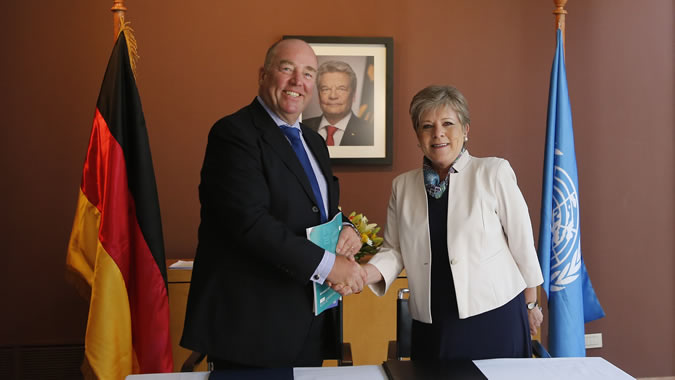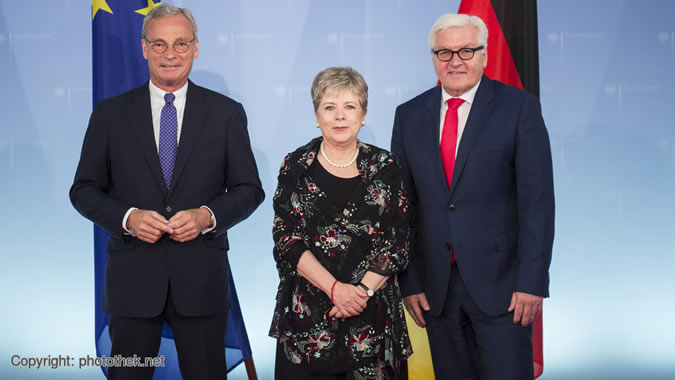ECLAC and BMZ Analyze in Lima a New Phase of Collaboration with a Focus on the 2030 Agenda
Alicia Bárcena, the regional organization’s Executive Secretary, and Christiane Bögemann-Hagedorn, Deputy Director General for Latin America of Germany’s Federal Ministry for Economic Cooperation and Development (BMZ), headed the meetings in the Peruvian capital.

Alicia Bárcena, Executive Secretary of the Economic Commission for Latin America and the Caribbean (ECLAC) of the United Nations, and Christiane Bögemann-Hagedorn, Deputy Director General for Latin America of Germany’s Federal Ministry for Economic Cooperation and Development (BMZ), met on Wednesday, September 27, in Lima, Peru to analyze the results of the current cooperation program and evaluate the scope of a new phase of collaboration for the 2018-2020 period.
Both Bárcena and Bögemann-Hagedorn are in the Peruvian capital participating in the IV Regional Conference on Prospects for Triangular Cooperation in Latin America and the Caribbean: The Role of Triangular Cooperation in the Implementation of the 2030 Agenda – Potentialities and Challenges, organized by the Peruvian Ministry of Foreign Affairs, the Peruvian International Cooperation Agency (APCI) and BMZ.
On January 26, 2016, ECLAC and the German government agreed that the joint cooperation program for the 2016-2018 period would be dedicated to strengthening the capacities of countries in the region to incorporate the 2030 Agenda for Sustainable Development into their national plans and strategies.
In Lima, both delegations identified the institutional consolidation of this process as a new challenge, along with making progress on monitoring the Sustainable Development Goals (SDGs). They also stressed the need to promote global alliances in which governments, the private sector and civil society actively participate.
Since ECLAC and Germany first engaged in cooperation activity, back in 1979, both parties have worked on numerous projects oriented toward promoting the socioeconomic and environmental development of Latin American and Caribbean countries.
In 2003, ECLAC and BMZ defined their cooperation as a “strategic alliance” based on shared values and in search of mutual benefits, a relationship that strengthened even further when Germany officially joined ECLAC as a member State in 2005.
At the meetings in the Peruvian capital, Bárcena was accompanied by the Deputy Executive Secretary for Administration and Program Planning, Raúl García-Buchaca, and the Chief of the Project Management Unit, Gerardo Mendoza.
Related content

Germany and ECLAC to Cooperate to Strengthen the Sustainable Management of Mining Resources in the Andean Region
At a meeting held today, the Ambassador of the Federal Republic of Germany in Chile, Rolf Schulze, and the regional organization’s Executive Secretary, Alicia Bárcena, also agreed to allocate…

Germany and ECLAC Reaffirm Cooperation Ties for Follow-up to the 2030 Agenda in Latin America and the Caribbean
The Executive Secretary of the UN organization, Alicia Bárcena, met with the German Foreign Affairs Minister, Frank-Walter Steinmeier.
Type
Country(ies)
- Latin America and the Caribbean
Related project(s)
Contact
Public Information Unit
- prensa@cepal.org
- (56 2) 2210 2040

